Raitong Organic Farms
Edibles, Inspiration Mar 25, 2015
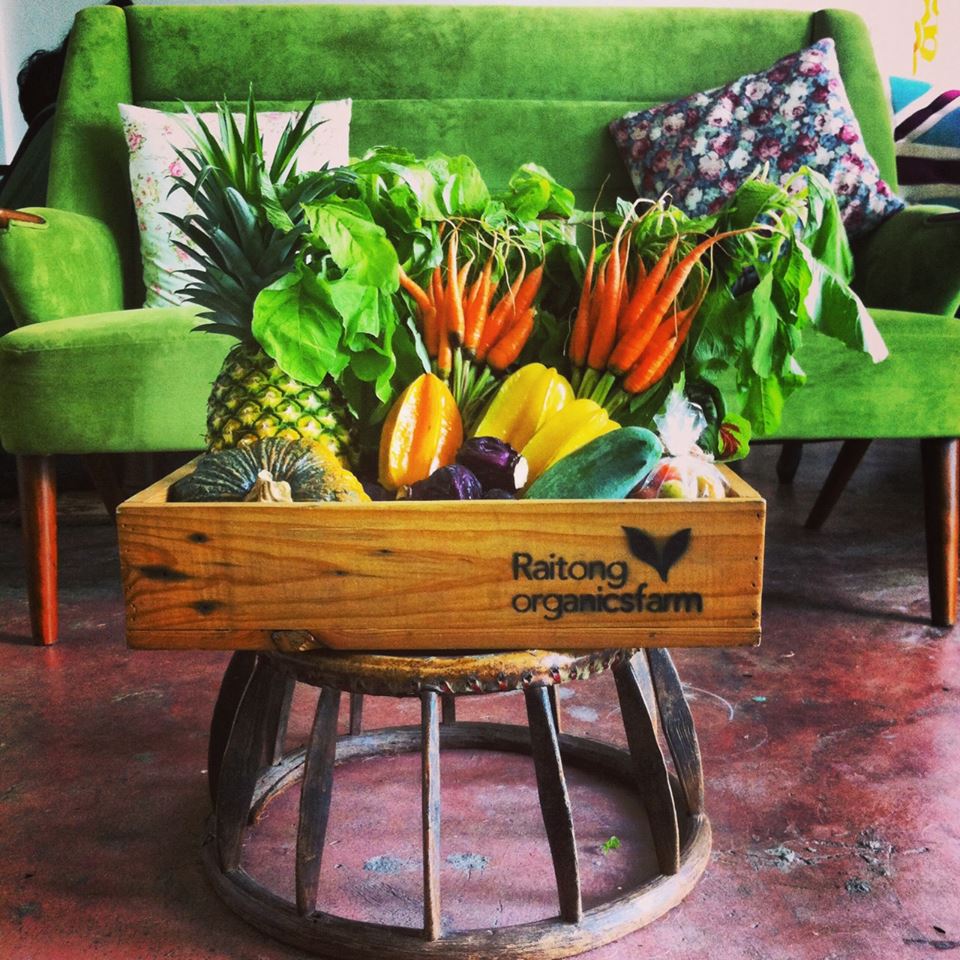
Thailand is an agricultural country, far and wide, growing everything from rice to coffee to every tropical fruit you can think of. This includes over 20 different kinds of mango. Once you leave the sprawling metropolis of Bangkok, the country sprawls out before you, acres upon acres of fields and farmland. Nestled in with the thousands of local farmers are Lalana & Bryan, the duo behind Raitong Organic Farms. Together they’re educating Thai farmers & consumers alike on the importance of getting back to our organic roots. I had the pleasure of meeting them in Pattaya at Wonderfruit Festival where I not only enjoyed several bottles of their organic ginger fizz, but fell hard for the amazing (& all too necessary) movement these two are inspiring in Thailand.
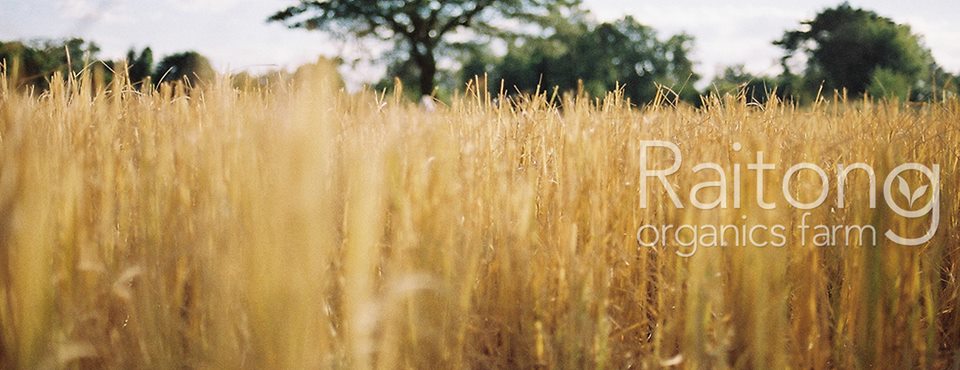 Name:
Name:
Lalana (Tui) Srikram & Bryan Hugill
Location:
Bangkok & Baan Hang Wao, Sisaket
Occupation:
Co-founders of Raitong Organics Farm Co., Ltd
Who makes up the main team behind Raitong Organics Farm?
Contrary to what many people seem to think, Raitong is actually a very small company with only 6 full-time staff, excluding Tui and Bryan. And, in spite of being so small, our team manages to pull off miracles every week by shipping out loads of Munching Boxes of which almost every box is customised, service our domestic wholesale customers with fruit/veg and gingerbeer, export organic rice around the world, and produce thousands of bottles of gingerbeer. They’re absolutely incredible!
How did the idea for Raitong Organics Farm come about? What inspired you to create ROF?
We began the concept of Raitong Organics Farm about 7 years ago when Tui’s parents asked her to come back to manage the family farm. She told them that this would only happen if we could manage the land under organic principles (to which they agreed), but we also realised very quickly that a successful farm with no customers is not a successful farm for long. So we began looking into the primary market in Thailand (i.e., Bangkok) to see whether it’d be possible for us to market our initial products (organic jasmine rice – white, brown, GABA and green tea infused GABA) here. This slowly lead us to meeting an initial group of very supportive end customers, including Bo.lan Restaurant, who has been our longest-standing wholesale customer to date. Then, in early 2012, we began looking into expanding our reach in the organic rice export market, and this lead to us establishing our company formally in mid-2012, together with the development of the CSA Munching Box as a tool to get more farmers into organic cultivation, theoretically giving us more organic acreage for rice growing. However, one thing lead to another, and the Munching Box programme grew into a product in and of itself, and we now support a network of some 70 organic farmers around Thailand that grow fruit and vegetables for us, as well as a handful of other innovative high-quality food producers, such as free-range chicken eggs, yoghurts, soft cheeses, bread, spirulina, cast iron cookware, tempeh and more.
What are the core beliefs of ROF?
We believe that being creative and innovative, developing an active community of farmers and consumers, and encouraging collaboration and partnerships is the future of organic food cultivation in Thailand. We further believe that merely growing organic produce is not enough, but that we should focus on constantly improving the quality and nutrient density of food. By doing this, everything on the farm and every relationship in our organic community needs to be working harmoniously, from cultivation to the time our produce ends up on your plate.
More informally, we strongly believe that we should be growing food that is safe and healthy to eat, just as I’d like to be able to buy/barter food from others that is not going to harm me due to dodgy growing / processing practices. It’s very simple…we quite literally harvest what we sow, and we’d prefer to have a positive impact both short and long term, rather than being in this for quick cash that leaves a trail of destruction behind us.
How many organic farmers around Thailand are currently working with ROF?
Besides the farmers that we work with for the CSA Munching Box, we work with around another 70 farmers to help service our rice market (domestic and export). These farmers are located in Sisaket, Yasothorn and Surin (for our rice farmers), and Chiang Mai, Chiang Rai, Mae Hong Son, Chonburi, Chantaburi and Prachuabkirikhan (for our fruit/veg farmers). For our range of naturally carbonated drinks, we’re both sourcing from these farmers, as well as growing several of the ingredients ourselves on our own farm and in our own community in Sisaket.
What is the CSA Munching Box? What is a CSA programme?
From a consumer standpoint, The CSA Munching Box is weekly subscription-based delivery of seasonal organic fresh fruit and vegetables direct from the farm to their doorsteps. In this respect, the CSA Munching Box is quite similar to CSA (community supported agriculture) programmes in the US, Europe and Japan. However, being part of a CSA programme is so much more than that, and the CSA Munching Box has a few key differences to match up to our social context in Thailand.
A CSA programme is basically a system by which farmers/fisherfolk and consumers are brought closer together, by cutting out as many middlemen as possible and usually where the consumers deal directly with the farmers and fisherfolk. The basic rationale is that our modern trade system has disconnected the point of cultivation/harvest and consumption to the point where neither end knows who each other are and their actions are instead dictated by the crowd of middlemen/traders inbetween. CSAs seek to change this.
Consumers get access to the freshest seasonal produce, and are able to speak directly to the person(s) growing/harvesting that produce to give instant positive/negative feedback to improve the system. At the same time, farmers and fisherfolk get access to a stable and relatively predictable market for all their products, not just the basic and homogenous items that supermarkets generally push for. Usually, consumers also share the risk of production/harvest (this is not yet the case in Thailand). Delivery can take many forms, whether home delivery or as collection points, or even at the farm itself (Bangkok is mostly about home delivery).
CSAs are also usually based on the “one farmer/harvester / many customers” model; however, in Bangkok, we’ve had to do a “many farmers/harvesters / many customers” model to account for our really varied customer base and also to have access to a variety of soil and climate types to grow a wider variety of produce (this is our attempt at mimicking the very strong seasonal variation in the US and Europe that Thailand doesn’t really experience).
Not sure we’re really the right people to be answering this particular question 
What does ROF hope to achieve long term?
We’re still a very young company with a lot of energy, so we still have a long way to go and a lot to do before we can retire to that ever-elusive palm-leaf hut and hammock at the beach and/or quiet mudbrick home in the mountains surrounded by forests and bordering on a clear bubbling stream 
Tell me about the ROF urban beekeeping program (BeeKK):
Honeybees, solitary bees, bumblebees, bats, moths and ants are key pollinators, collectively responsible for much of the food that we eat daily. In spite of this importance in the global food chain and ecosystem, honeybees, as with many pollinators, around the world have come under threat due to a number of factors including:
(a) Foliar sprayed and systemic pesticides use, especially neonicotinoid-based pesticides, resulting in severe nervous and digestive damage (usually fatal).
(b) Increased use of genetically-engineered crops (esp. BT crops, such as cotton, corn and papaya), resulting in nervous tissue damage and memory impairment, leading to disorientation and eventually death.
(c) Habitat and biodiversity loss, resulting in significant competition for food resources and nest sites between native honeybees and the more aggressive imported European honeybees (Apis mellifera).
(d) Increased prevalence of large-scale monoculture cropping systems (e.g., rice, corn, cotton), resulting in poor nutritional diversity and diet-related stress/diseases, and eventually either swarming or colony collapse.
(e) Various pests and diseases due to stress (weather conditions, pollution, poor husbandry techniques, etc.).
(f) Extermination of valuable feral swarms in urban areas, usually due to ignorance (of their critical ecosystemic and species genetic value) and fear (of being stung), rather than requesting that swarms be removed properly and relocated elsewhere.
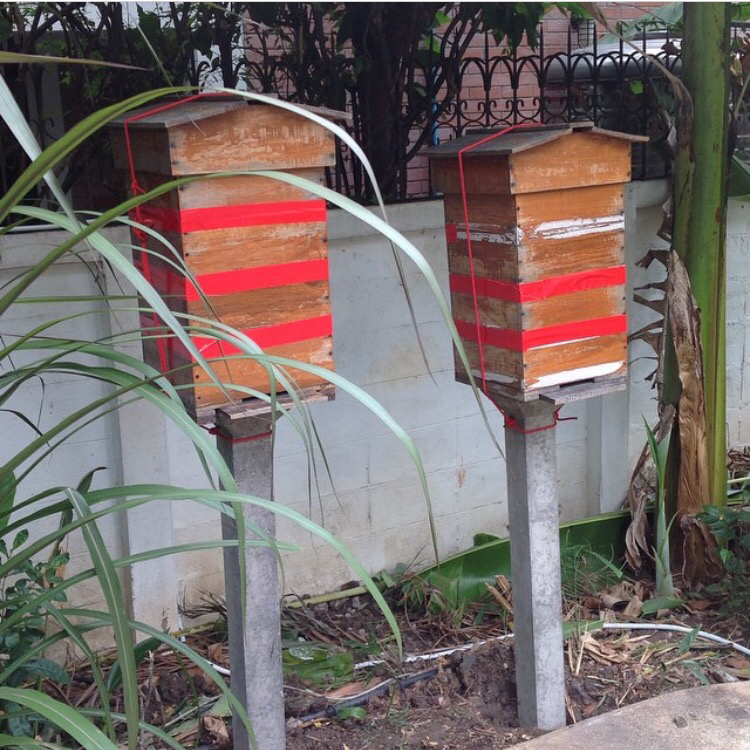
Urban beekeeping is becoming an increasingly common activity amongst city-dwellers that (a) wish to take part in global efforts to save honeybees and ensure the perpetuation of their critical pollination services, (b) are interested in knowing the source of their honey and are concerned about contamination and food miles, and (c) wish to learn about animal husbandry irrespective of whether they reside in small houses, condominiums or shared accommodation. Urban beekeeping is becoming a growing trend around the world, and we’re now bringing it to Bangkok initially and hopefully expanding to other cities in Thailand in the future.
Much of the success of urban beekeeping is related to three factors: (a) cities usually have many more flowers over the course of the year than rural areas, resulting in an abundance of food for honeybees throughout the year, (b) cities usually have very little neonicotinoid pesticides in use, resulting in little to no chance of colony collapses, and (c) there are many more places for bees to form nests in cities (holes in trees, inside roofs, between walls, even inside your postbox, inside old boxes and tires, etc.).
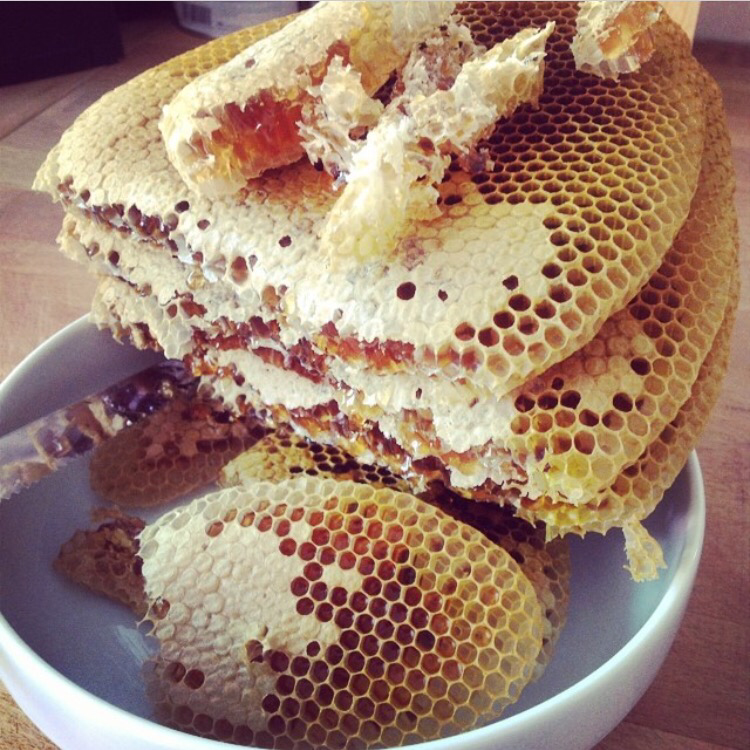
Our focus is on the Asian honeybee (Apis cerana). This bee species is native to South and Southeast Asia, sharing the range with the Giant honeybee (Apis dorsata) (the huge bee we normally see hanging in caves and high up in trees) and Dwarf honeybee / Red dwarf honeybee (Apis florea) (usually forming small colonies in trees), besides several other smaller communal and solitary bees, and bumblebees. The Asian honeybee is the only one to make comparatively large quantities of honey and wax, settles readily in a hive, and is generally very docile, making husbandry relatively easy. And the upside is that Asian honeybees evolved with nosea disease and varroa mites, which are serious issues in European bee colonies. We are also using a different type of hive system than most folks are used to seeing (the one with frames). Our hives are frameless respecting the bees’ basic ecology and allowing them to build freeform, and continuously from top to bottom. Essentially, while we can get honey and wax from these hives, our focus is more on the pollination aspect first, and honey/wax second.
We have also started to look into colonies of tiny stingless honeybees, but it’s still very early days yet and we’re still learning about them 
If anyone wants to be part of the fun, email us at beekk@raitongorganicsfarm.com. They can also learn more on our Facebook page (www.fb.com/BeeKKUrbanBeekeeping).
What else is currently in the works for the awesome team behind ROF?
GINGER FIZZ! We spent a big chunk of time in 2014 working on developing our 100% natural and non-alcoholic gingerbeer, using locally-sourced ingredients. Besides the original, roselle, pineapple, cinnamon and sour tamarind flavours, we’re also developing a range of flavours that are uniquely Thai (keep an eye out for our colour-changing peaflower gingerbeer in early 2015!). We’re currently wholesaling to several places around Bangkok, e.g., Mandarin Oriental Hotel, Nahm, Gaggan (we’re also working on an exclusive flavour for them), Bolan, WTF, Opposite Mess Hall, Maggie Choo’s, Nahmsaa Bottling Trust, Vesper, Neverending Summer, Bangkok Bagels and many more, and also supply retail customers directly if they contact us (fizz@raitongorganicsfarm.com).
Besides gingerbeer, we’re also working on a 100% natural tonic water in collaboration with Bootleggers Trading Co. (www.bootleggerstrading.com), which we hope to begin marketing in early 2015. This is the real deal, so we think it’ll go down a storm in BKK
Tui’s also been quietly working on developing a range of 100% organic babyfood, but this is a slow process as the requirements are extremely stringent and we want to make absolutely sure we do it properly.
So, yeah, it’s going to be a pretty relaxing 2015 for us
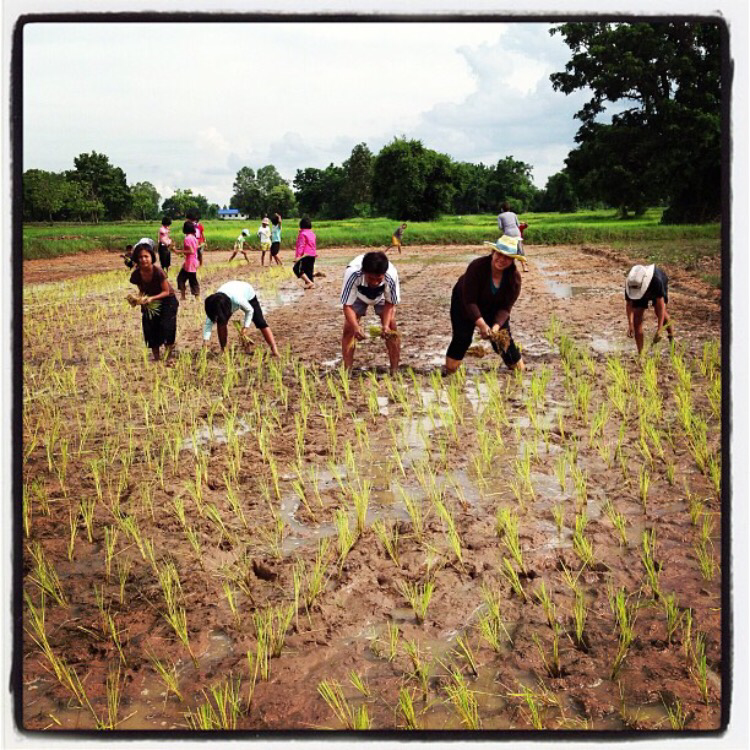
How can people get involved with ROF and your efforts?
The easiest is simply for folks to contact us via email (info@raitongorganicsfarm.com) either with their CV (if they’re looking for a job) or some suggestions of what they think they could do (which means they took the time to learn about us before emailing). This makes things a lot easier for us! Some of the things we can think of offhand that we urgently need help with are: WWOOFers and permaculturalists whom we could ship out to the various farms we work with (preferably fluent in English and Thai, and not wanting to turn every farm into a yoga retreat), website and CRM development, basic data entry, brand ambassadors, proposal/grant writers, event helpers, designers and writers, and much much more 
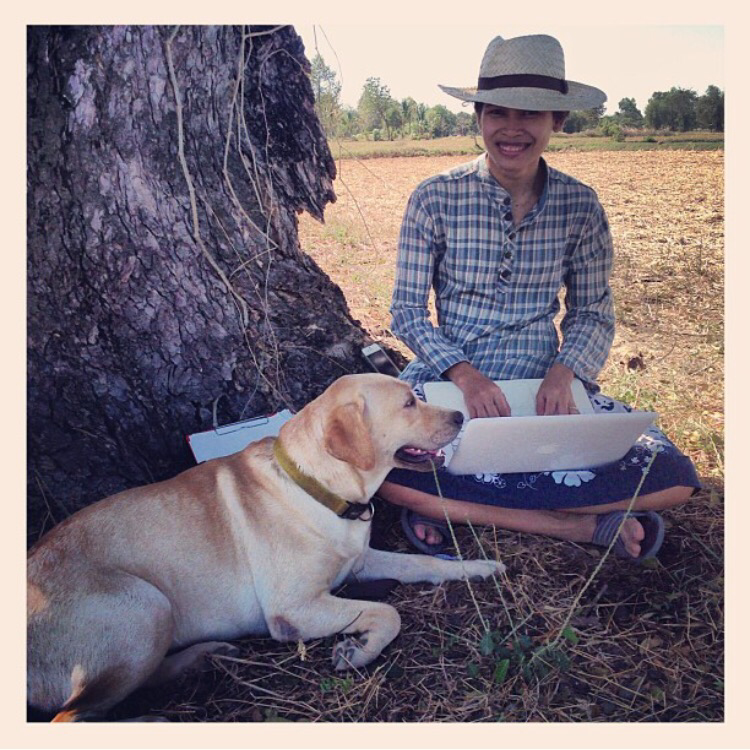
What keeps you motivated in hard times or when you come across difficult obstacles?
To be honest, the energy to keep sustaining our work comes from a few places: (1) the longer we work in organics, the more we realise how totally screwed up the conventional food system is in Thailand (and having a little son whom we are trying our best to raise well, this becomes all the more apparent), (2) we probably have the best customers in the world, many of whom have been with us since the very beginning of the Raitong concept, (3) our team works their asses off to get the job done usually under very tight deadlines, and (4) our farmers and suppliers are just plain awesome.
Don’t misunderstand me, we also bicker and argue, often don’t see eye-to-eye, and are learning about this “business” thing as we go along, but at the end of the day, we’re able to sleep peacefully at night in the full knowledge that we’re not poisoning anyone, are honest in our business dealings, and are trying our level best to treat both our customers and suppliers respectfully.
Words of wisdom or life motto?
Who has time for mottos?
If anyone wants to learn more about us, they can check out our website (www.raitongorganicsfarm.com), our Facebook pages (www.fb.com/RaitongOrganicsFarm, www.fb.com/CSAMunchingBox, www.fb.com/BeeKKUrbanBeekeeping) or stalk us on Instagram and Twitter (@RaitongOrganics).
They could also simply wander over to our office in Bangkok and hang out for a bit to chat over a few bottles ice-cold gingerbeer. You know…like regular folks did in the good ol’ days before the Internet made us all socially inept
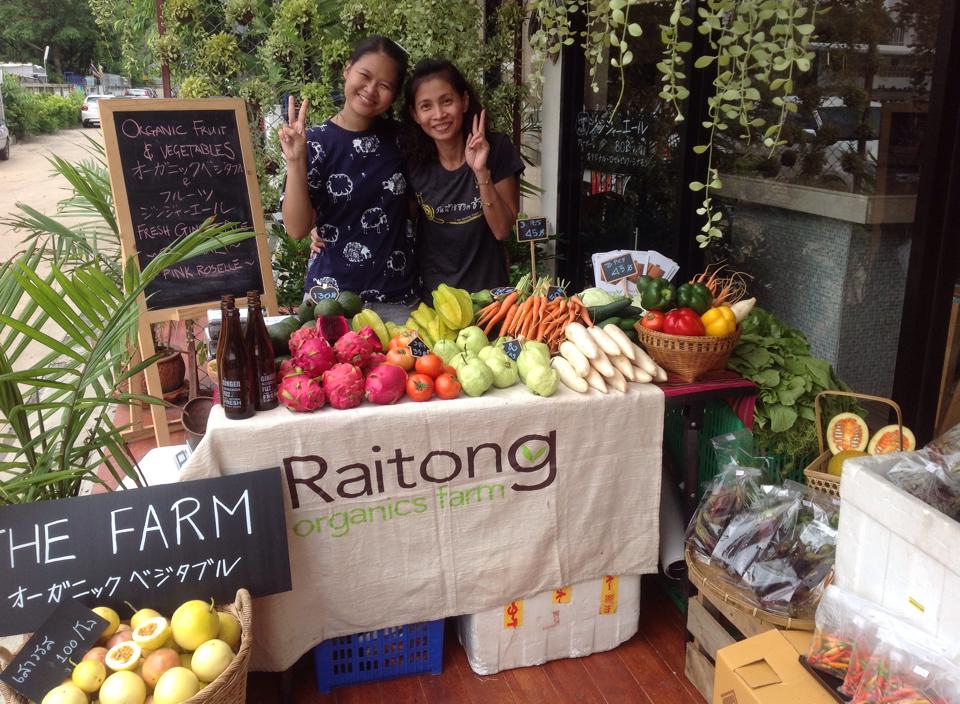
And there you have it. Passion & hard work not to mention the drive to make YOU EAT BETTER. You can thank them in person over a bottle of ginger fizz or come with me this summer to visit the beautiful couple on their farm in Sisaket (& maybe even plant some rice or pick some veggies). Be sure to keep up with them on social media or find ways to get involved & help make eating organic for everyone.
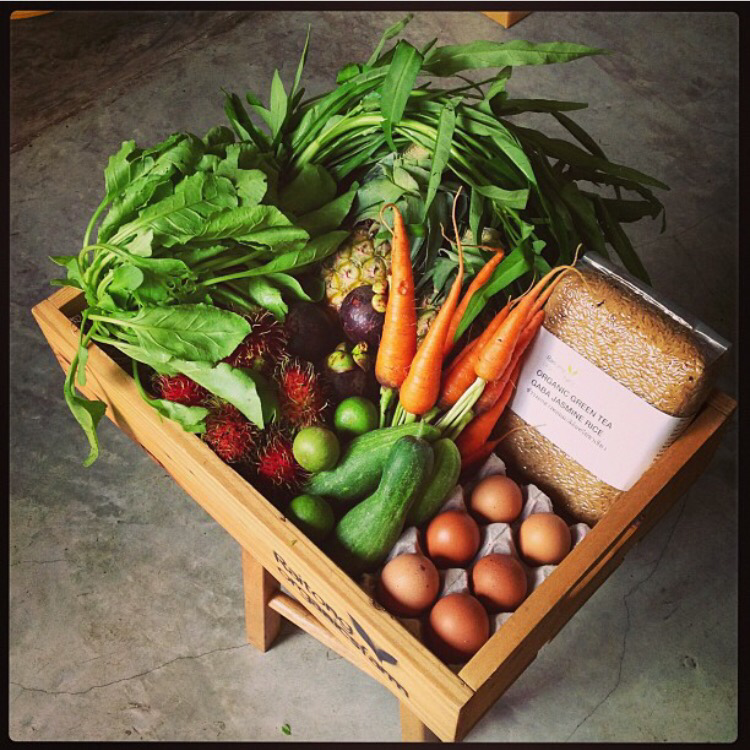
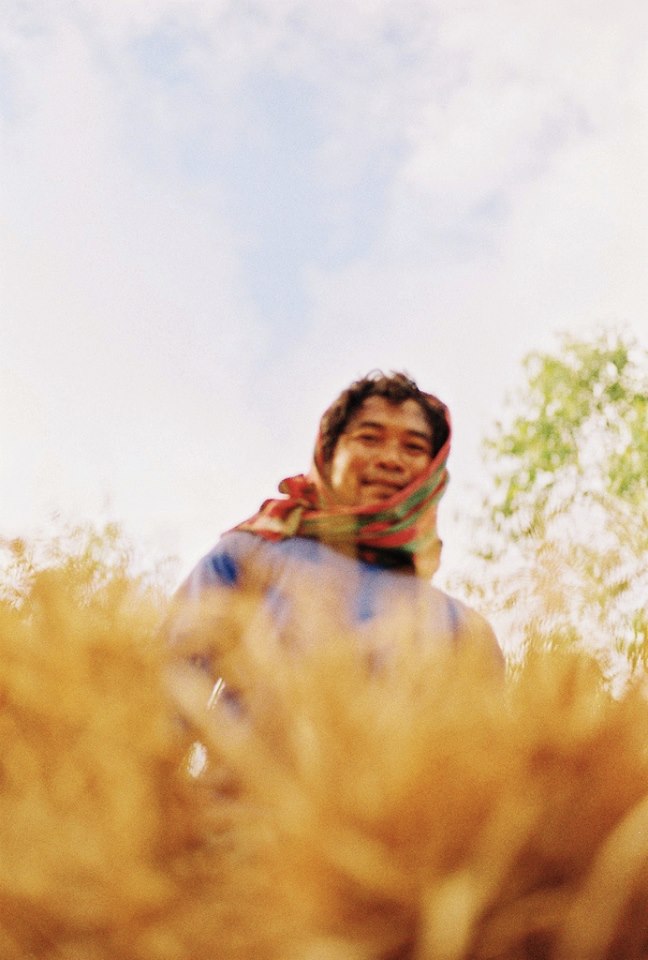
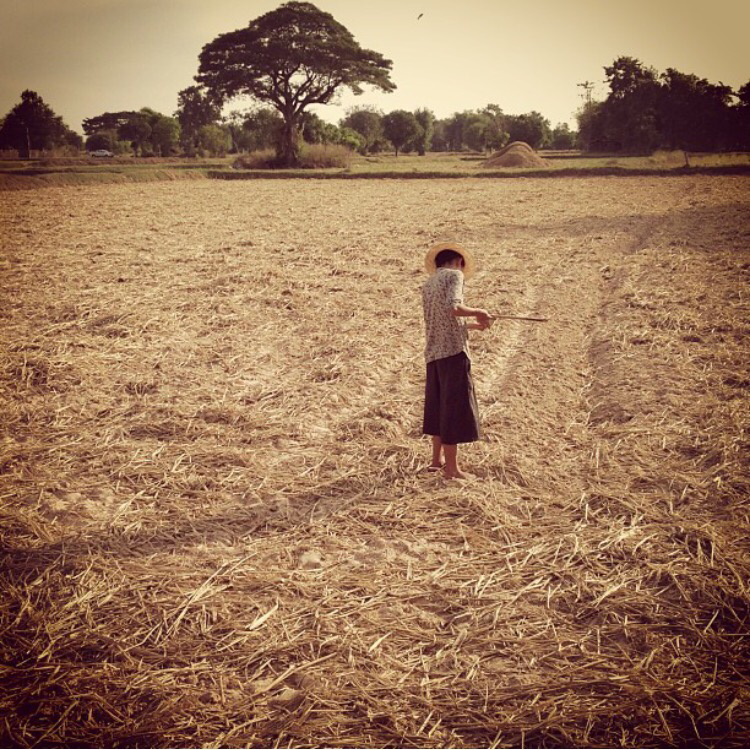
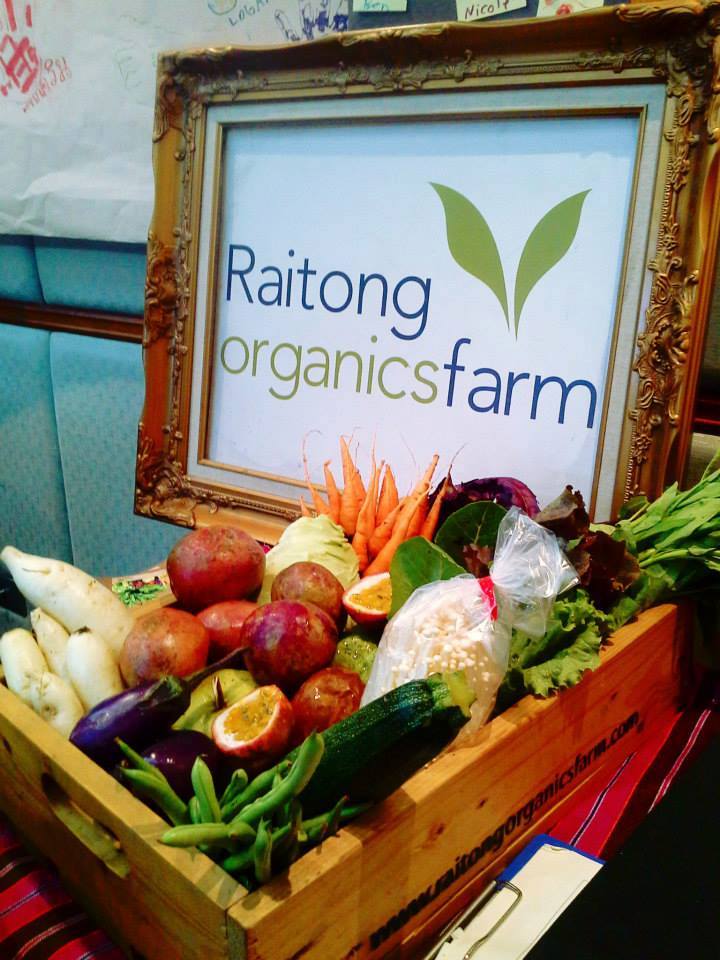
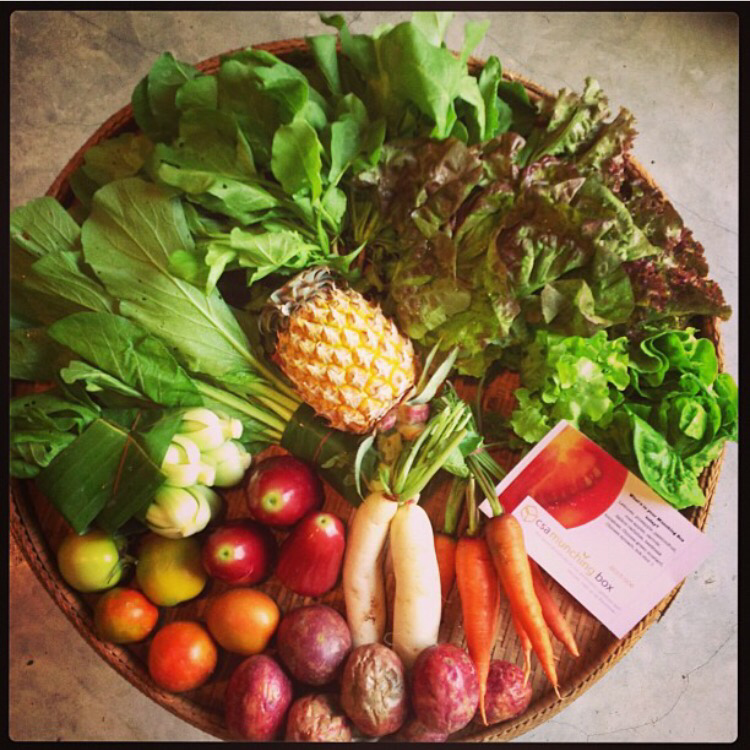
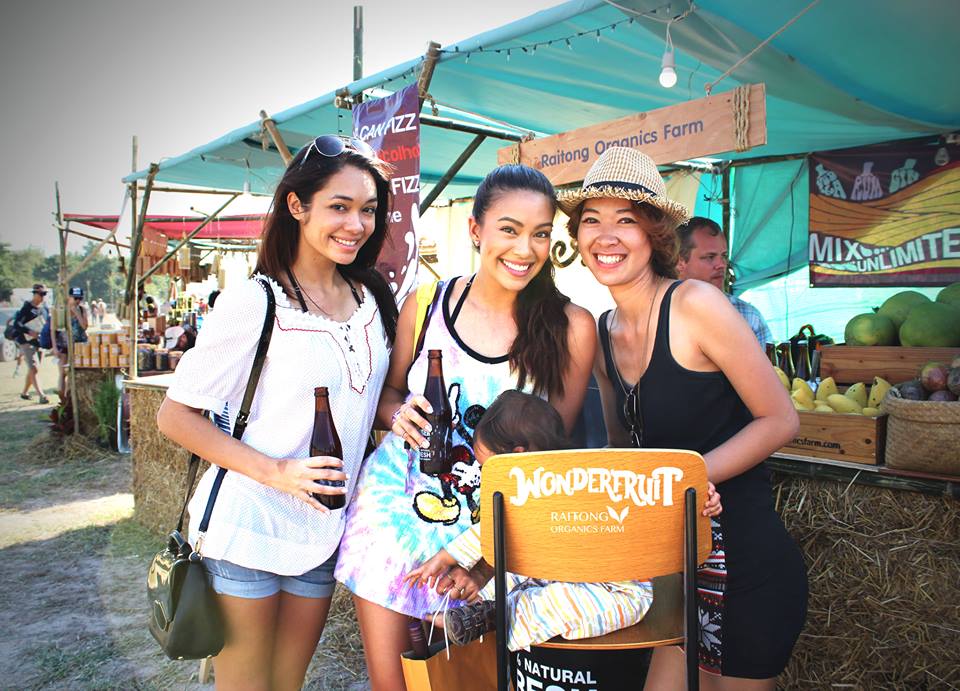
 ถ้าพลาดรายการสดวันนี้ทาง คลื่นวิทยุ MET107fm กับรายการ Music&Lyrics. นี่เลยค่ะเทย่าเอามาให้ดู
ถ้าพลาดรายการสดวันนี้ทาง คลื่นวิทยุ MET107fm กับรายการ Music&Lyrics. นี่เลยค่ะเทย่าเอามาให้ดู 
 หวังว่าจะชอบกันนะคะและขอบคุณมากๆกับทุกคนที่เข้ามาดูแล้ว […]
หวังว่าจะชอบกันนะคะและขอบคุณมากๆกับทุกคนที่เข้ามาดูแล้ว […]



